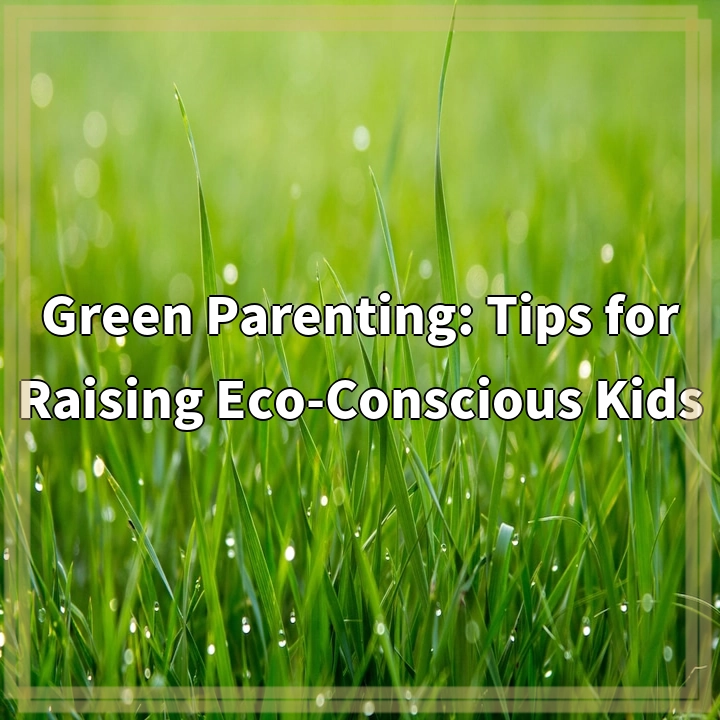
What is Green Parenting?
Green parenting is an approach to raising children that focuses on incorporating eco-friendly and sustainable practices into daily life. It involves teaching kids about the importance of protecting the environment, conserving resources, and making conscious choices that have a positive impact on the planet. Green parenting encompasses various aspects, including reducing waste, using environmentally friendly products, promoting outdoor play, and fostering a connection with nature.
Real-World Problems Associated with Green Parenting
While green parenting is gaining popularity, it is not without its challenges. Understanding the real-world problems can help parents better navigate this approach:
1. Balancing Convenience and Sustainability
Raising eco-conscious kids often means making choices that prioritize sustainability over convenience. It can be challenging to find eco-friendly alternatives to everyday products, such as diapers, clothing, and toys. Striking a balance between convenience and sustainability is crucial, as it ensures that green practices are sustainable in the long run and can be incorporated into the family’s lifestyle.
2. Peer Pressure and Social Influence
Children are constantly exposed to societal norms and peer pressure, which can sometimes clash with green parenting values. For example, attending birthday parties or social events where single-use items are prevalent can create conflicts between eco-conscious choices and fitting in with their peers. It’s important for parents to navigate these situations by explaining the environmental impact to their kids and finding creative alternatives that align with their values.
3. Access to Green Resources
Not all communities have equal access to green resources and sustainable options. This can make it more challenging for parents to find organic foods, eco-friendly products, or join community initiatives that promote sustainable living. Addressing this disparity and seeking out local initiatives and resources can help overcome these barriers.
4. Overconsumption and Materialism
In a consumer-driven society, children are often exposed to excessive advertising and the lure of material possessions. Green parenting encourages a shift away from overconsumption and materialism, emphasizing the value of experiences over material goods. This can be challenging, as children may still desire the latest toys or gadgets. Teaching them about sustainable consumption and the importance of reusing and recycling can help counteract these influences.
By acknowledging and addressing these real-world problems, parents can navigate the challenges associated with green parenting and foster an eco-conscious mindset in their children. Together, we can raise the next generation to be stewards of the environment and create a more sustainable future.

Solutions for Green Parenting
As parents, there are practical steps we can take to address the challenges associated with green parenting:
1. Research and Choose Sustainable Alternatives
Investigate eco-friendly alternatives for everyday products, such as cloth diapers, organic clothing, and non-toxic toys. Look for certifications like USDA Organic or Global Organic Textile Standard (GOTS) to ensure the products meet sustainability criteria. Consider joining online parenting communities or forums to exchange ideas and recommendations.
2. Communicate and Educate
Talk to your children about the importance of protecting the environment and explain the reasons behind green choices. By understanding the significance, children are more likely to embrace eco-conscious practices willingly. Engage in age-appropriate discussions about climate change, resource conservation, and the impact of human activities on the planet.
3. Be a Role Model
Show your children the power of leading by example. Demonstrate sustainable behaviors like recycling, upcycling, composting, and conserving energy. Involve them in eco-friendly activities, such as gardening, volunteering for local conservation initiatives, or participating in clean-up events. By seeing your commitment to green practices, children will be inspired to follow suit.
4. Create Alternative Celebrations
Instead of traditional parties with excessive waste, consider celebrating in more eco-friendly ways. Host nature-themed parties, where kids can engage with the outdoors and participate in fun activities like plant potting or insect exploration. Encourage guests to bring eco-friendly gifts or forego gifts altogether in favor of donating to environmental organizations.
5. Advocate for Change
Join forces with other like-minded parents and engage in collective action. Support local initiatives and advocate for greener policies in schools and communities. Encourage schools to implement recycling programs, promote sustainable practices in classrooms, and provide environmental education opportunities.
By implementing these solutions, parents can overcome the challenges of green parenting and instill a genuine love and respect for the environment in their children. Together, we can raise a generation that prioritizes sustainable living and contributes to a healthier planet.















